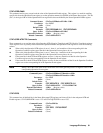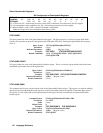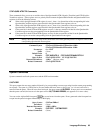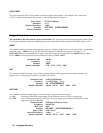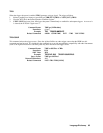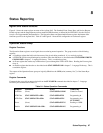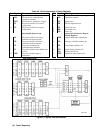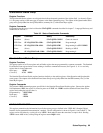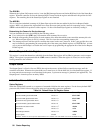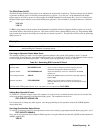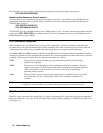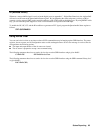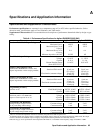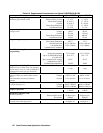
Status Reporting 89
Questionable Status Group
Register Functions
The Questionable Status registers record signals that indicate abnormal operation of the Agilent SAS. As shown in Figure
8-1, the group consists of the same type of registers as the Status Operation group. The outputs of the Questionable Status
group are logically-ORed into the QUES(tionable) summary bit (3) of the Status Byte register.
Register Commands
Programming for this group is derived from the STAT:QUES commands described in chapter 7 - Language Dictionary and
summarized in Table 8-3.
Table 8-3. Status :Questionable Commands
Register Command Query Cleared By
Condition (None)
STAT:QUES:COND?
Cannot be cleared
PTR Filter
STAT:QUES:PTR <NRf> STAT:QUES:PTR? Programming 0
NTR Filter
STAT:QUES:NTR <NRf> STAT:QUES:NTR? Programming 0 or STAT:PRES
Event (None)
STAT:QUES:EVEN? Reading or *CLS
Enable
STAT:QUES:ENAB <NRf> STAT:QUES:ENAB?
Programming 0
Standard Event Status Group
Register Functions
This group consists of an Event register and an Enable register that are programmed by common commands. The Standard
Event Status Event register latches events relating to interface communication status (see Figure 8-1). It is a read-only
register that is cleared when read.
Read query *ESR?
Cleared by *CLS *ESR?
The Standard Event Status Enable register functions similarly to the enable registers of the Operation and Questionable
status groups. The outputs of the Standard Event Status Group are logically-ORed into the RSB summary bit (5) of the
Status Byte register.
Register Commands
The common *ESE command programs specific bits in the Standard Event Status Enable register. Because the Agilent
SAS implements *PSC, the register is cleared at power on if *PSC = 1. *ESR? reads the Standard Event Status Event
register and reading the register clears it.
Programmed by *ESE <NRf>
Read query *ESE?
Cleared by *ESE 0
STATUS BYTE REGISTER
This register summarizes the information from all other status groups as defined in the "IEEE 488.2 Standard Digital
Interface for Programmable Instrumentation" standard. The bit configuration is shown in Figure 8-1 and Table 8-2. The
register can be read either by a serial poll or by *STB?. Both methods return the same data, except for bit 6. Sending
*STB? returns MSS in bit 6, while polling the register returns RQS in bit 6.



